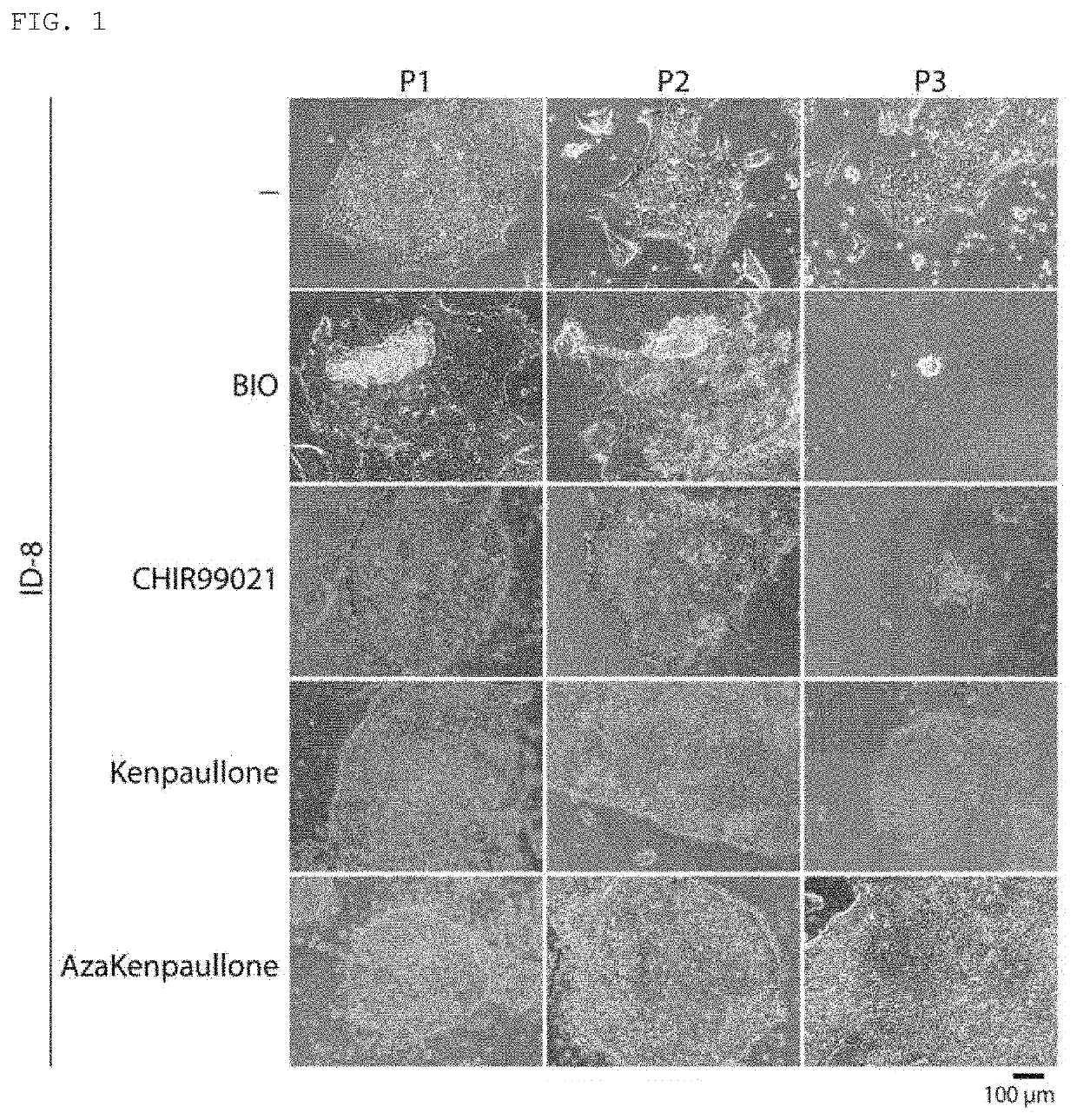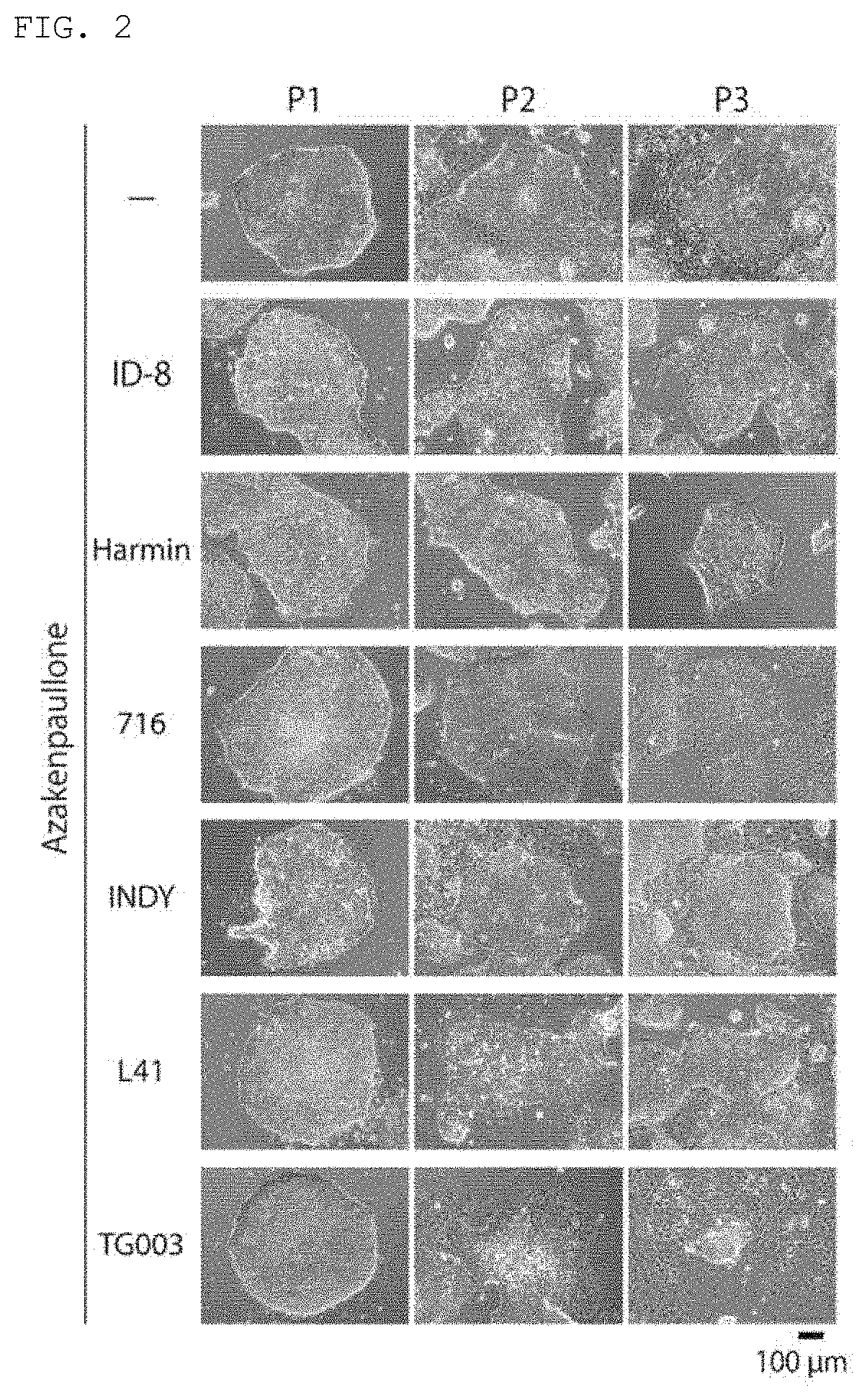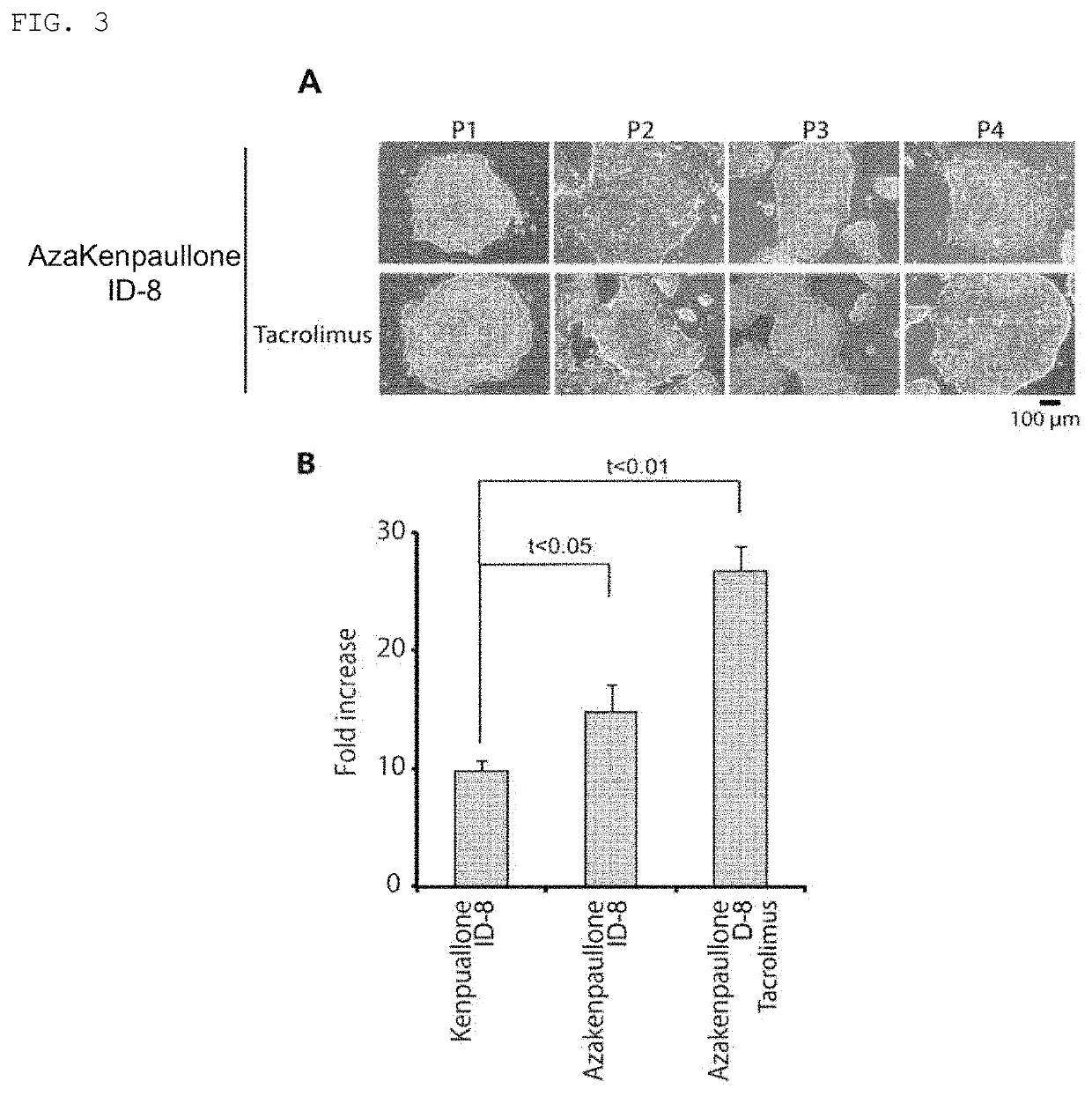Culture medium for pluripotent stem cells
a technology of pluripotent stem cells and culture medium, which is applied in the field of culture medium for pluripotent stem cells, can solve the problems of significant cost and cost impedement of pluripotent stem cell use, and achieve the effects of less variation in properties between lots, less protein components, and very inexpensive preparation
- Summary
- Abstract
- Description
- Claims
- Application Information
AI Technical Summary
Benefits of technology
Problems solved by technology
Method used
Image
Examples
example 1
e of Pluripotent Stem Cells Using a Medium Comprising a Gsk3β Inhibitor and a DYRK Inhibitor
[0068]Preparation of Basal Medium
[0069]25 mL of a solution in which a powder DMEM / F-12 medium (D0547, produced by Sigma-Aldrich) had been diluted two-fold with water, 1.4 mL of 6% sodium hydrogen carbonate solution, 0.75 mL of 1 M HEPES solution, 0.045 mL of 0.23 M ascorbic acid solution, 0.9 ML of ITS (Insulin-Transferrin-Selenium: 1 mg / ml-0.55 mg / ml-0.7 μg / ml) solution (ITS-G 41400-045, produced by Life Technologies), and 16.905 mL of water were mixed to obtain 45 mL of basal medium (340 mOsm, pH 7.2 to 7.5).
[0070]Preparation of Medium
[0071]A GSK3β inhibitor (1-azakenpaullone (A3734, produced by Sigma-Aldrich), kenpaullone (1094-1, produced by BioVision), CHIR99021 (1386, produced by Axon Medchem), or BIO (B1686, produced by Sigma-Aldrich)), and a DYRK inhibitor (ID-8 (11786, produced by Sigma-Aldrich), harmine (Ser. No. 10 / 010,324, produced by Cayman Chemical), an indirubin analog 716 (6i)...
example 2
FAT Inhibitor in Subculture of Pluripotent Stem Cells
[0078]A medium further comprising an NFAT inhibitor (tacrolimus (FK-506) (1007965, produced by Cayman Chemical)), in addition to a GSK3β inhibitor (1-azakenpaullone or kenpaullone) and a DYRK inhibitor (ID-8), was prepared as in Example 1. Using this medium, subculture and cell observation were performed as in Example 1. Separately from this, passage P1 was performed using this medium, as in Example 1, followed by culturing for 6 days without performing passage. Thereafter, the number of the cells was counted in accordance with a standard method, and, based on the counted number of cells, how many times the number of the cells increased within 6 days was calculated.
[0079]Results
[0080]FIG. 3A shows images of the cells, and FIG. 3B show the fold increase of the cells.
[0081]FIG. 3A indicates that ES cells are maintained in an undifferentiated state even when an NFAT inhibitor (tacrolimus) is further added, in addition to a GSK3β inhi...
example 3
Culture of ES Cells
[0082]A medium (medium 1) comprising a GSK3β inhibitor (1-azakenpaullone) and a DYRK inhibitor (ID-8), and a medium (medium 2) further comprising an NFAT inhibitor (tacrolimus) in addition to a GSK3β inhibitor (1-azakenpaullone) and a DYRK inhibitor (ID-8) were prepared as in Example 1. These media were used with human ES cell lines KhES-1, human ES cell lines H9 (W09, provided by WiCell), human iPS cell lines 253G1 (HPS0002, provided by Riken BioResource Center), human iPS cell lines 201B7 (HPS0063, provided by Riken BioResource Center), and human ES cell lines H1 (W01, provided by WiCell) to perform subculture and cell observation, as in Example 1.
[0083]Results
[0084]FIG. 4A shows images of the cells when medium 1 was used. FIG. 4B shows images of the cells when medium 2 was used.
[0085]FIGS. 4A and 4B indicate that both media 1 and 2 maintain various pluripotent stem cells in an undifferentiated state over a long period of time (P17 to P60).
[0086]ES cells and iPS...
PUM
| Property | Measurement | Unit |
|---|---|---|
| pH | aaaaa | aaaaa |
| concentration | aaaaa | aaaaa |
| time | aaaaa | aaaaa |
Abstract
Description
Claims
Application Information
 Login to View More
Login to View More - R&D
- Intellectual Property
- Life Sciences
- Materials
- Tech Scout
- Unparalleled Data Quality
- Higher Quality Content
- 60% Fewer Hallucinations
Browse by: Latest US Patents, China's latest patents, Technical Efficacy Thesaurus, Application Domain, Technology Topic, Popular Technical Reports.
© 2025 PatSnap. All rights reserved.Legal|Privacy policy|Modern Slavery Act Transparency Statement|Sitemap|About US| Contact US: help@patsnap.com



